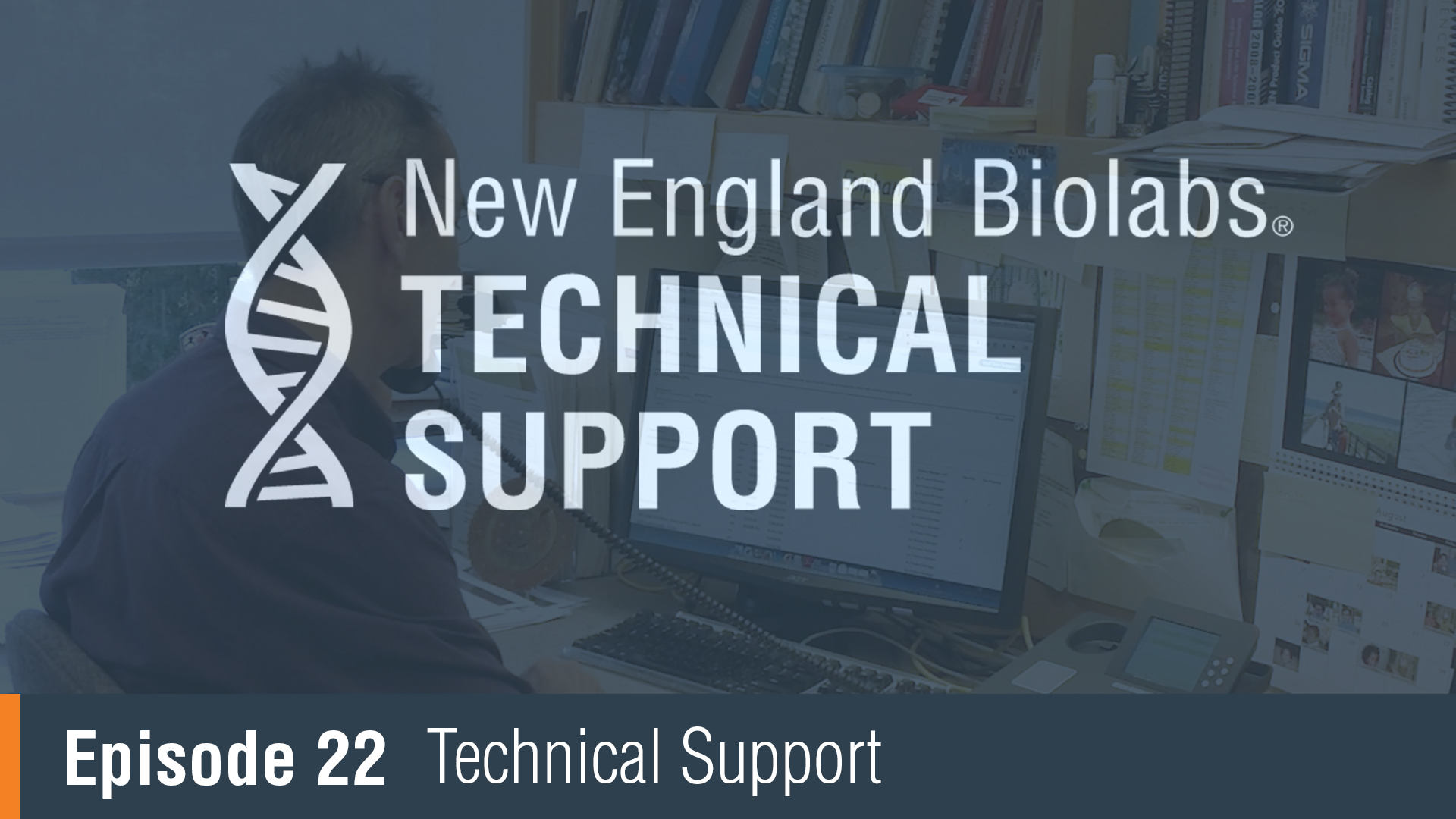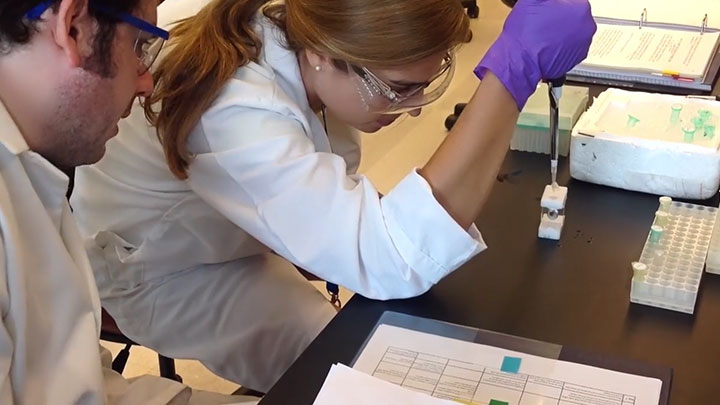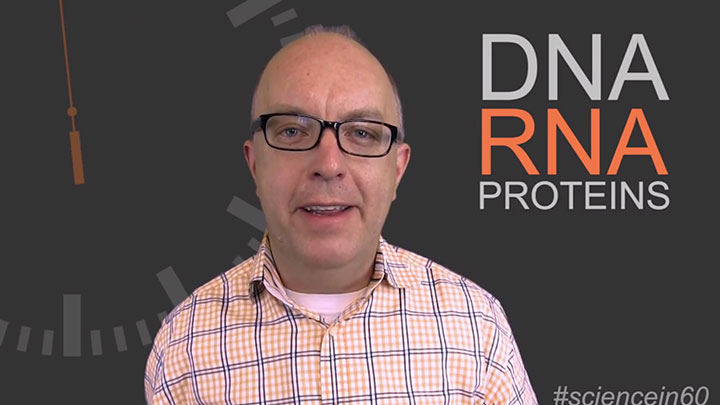NEB® TV Ep. 26 – Course Support and Reagent Donation
Script
Welcome to NEB TV. Today I am joined by Penny Devoe from our marketing department. Hey, Penny.
Hey, Deana.
And, we are talking about NEB's Course Support program. Now Penny, what does NEB offer to teaching labs?
Sure. In addition to the vast amount of educational support material we have available on the website, we offer a Course Support program. So, NEB offers a list of our most popular products, free of charge, to teaching institutions such as community colleges, high schools, and teaching labs.
That's great. And, how long has NEB been doing this?
No one's been able to pinpoint an exact date, but we estimate about 30, 35 years, if not more. NEB has always had commitment to advancing the life sciences, and what better way to do this than to support the teaching labs that are teaching our scientists of the next generation?
That's true. Can you share some examples of institutions that have taken advantage of this program?
Sure. NEB provides reagents for the Molecular Biology Workshop that we host at Smith College every summer. This is a two week course where non-scientists can gain a wide array of molecular biology experience. We have also supported to Gloucester Marine Institute and BioTeach, a life sciences education program offered through the Massachusetts Biotechnology Education.
That's great. And today, we'll hear from some other groups that've taken advantage of this program. First, we will hear from Natalie Kuldell, who is the founder and executive director at BioBuilder. Then, we will speak with Vic Sivanathan, a program officer for the Science Education Alliance, which is a program at the Howard Hughes Medical Institute. NEB donates a significant amount of reagents to the Amgen Biotech Experience. We will hear from one of the teachers who utilizes this program to expose her high school students to lab work. And lastly, we will talk about the iGEM Competition and hear from a couple of teams that participated.
But Penny, before we get to that, can you tell us how viewers can apply for the program?
Anyone who is interested can visit our Course Support and Reagent Donation page to learn more. There, you can submit an inquiry for more information, and we will quickly get back to you with more details.
And, what if I'm an educator outside of the U.S.? Can I participate?
Yes. In that case, they would need to contact their local distributor or subsidiary. And again, that information can be accessed via the Course Support page.
Great. Then, let's get started.
The NEB Course Support helps the ABE program to provide a molecular biology experience to thousands of students and teachers across the U.S. and internationally each year. We provide a high level of equipment to students, but really need the constant influx of reagents that are provided by NEB to continue to reach these numbers of students.
The consumables and restriction enzymes we use, buffers, etc., from NEB, have allowed us to access far more students, allowing them to learn the techniques, experience the labs themselves, and feel like scientists. And, exposing students to real science is really important for developing and creating minds that stay interested in science.
It changes the approach to science, in that it's a discovery process. We get to learn more science as we teach more science. And then, bringing in engineering allows us to apply the work that we're doing to problems that matter to the students, most of all.
Teaching science the way science is actually practiced can be a very positive and motivating force for students in the sciences. So, the resources that NEB is providing enables all institution types, and by proxy, all students, to engage in research. NEB is essentially making research experiences an equitable practice for engaging students in the sciences.
When we engage with students who have gone through the SEA-PHAGES program, the question that we hear over and over again is, "What are all of these genes that we're annotating actually doing?" It's clear to us that the SEA-PHAGES program is training the students to ask these important questions, and they're eager to get to work on them. It's important to always continue asking questions. Questions do not end at the end of a course. We always have new, exciting things to explore.
So, a research experience can positively influence a student's decision to remain in the sciences.
Every student that we have in our classrooms will someday be dialoguing about important things in medicine and science that these programs support. I wanna create life-long learners, so we're really thankful for all of the things that NEB does to support community and education around molecular science.
iGEM is the International Genetically Manufactured Machine Competition, which inspires young scientists in the field of synthetic biology. NEB offers a selection of free reagents to all registered teams. Recently, NEB invited several iGEM teams to our campus in Ipswich. We had a great day of learning and tours, culminating in a seminar by our Nobel Laureate Rich Roberts.
Hi NEB TV. We are Team Tec-Chihuahua from Mexico.
We are the UC Davis iGEM Team.
This is the University of Tennessee iGEM team.
We're on the United States Air Force Academy iGEM team.
We are Team Aix Marseille, and we are working on the Breaking Bugs project. So, the project's aim is to develop a trap to treat bed bugs infestations. We used the Monarch DNA purification kit, and the Monarch PCR Cleanup Kit. And, we used the restriction enzymes and the T4 ligase.
This year we developed a mammalian cell based bioassay for detecting physiological stress. The products from NEB we used are Q5 polymerase, XbaI, SpeI, Eco. I could go on. Restriction enzymes, polymerases, and much more.
We fight against two diseases of bees, American and European Foulbrood. And, these diseases affect bee larva, and they make a collapse in the whole colony. So, we produce antimicrobial peptides in E. coli to boost their immune system, and so the larvae can defend against these deadly diseases.
And, we are generating tools to bioremediate halogenated compounds in the environment. And, we would like to thank NEB for providing us restriction enzymes and, overall, making synthetic biology easier for undergraduate students trying to get into the field. So, thank you.
Penny, thanks so much for joining us today.
Thanks for having me.
I personally love this program, so I'm really excited that we get to share this information with everyone. Can you just remind us one more time what people can do to apply for the Course Support program?
Sure. Anyone that's interested can visit the website below, fill out a form, and we'll be in touch soon.
Great. Thanks so much for joining us today. And, as always, if you have any suggestions for future episodes, please let us know.
Related Videos
-

NEB® TV Ep. 22 - Technical Support at NEB® -

Molecular Biology Summer Workshops -

Molecular Biology Summer Workshop

